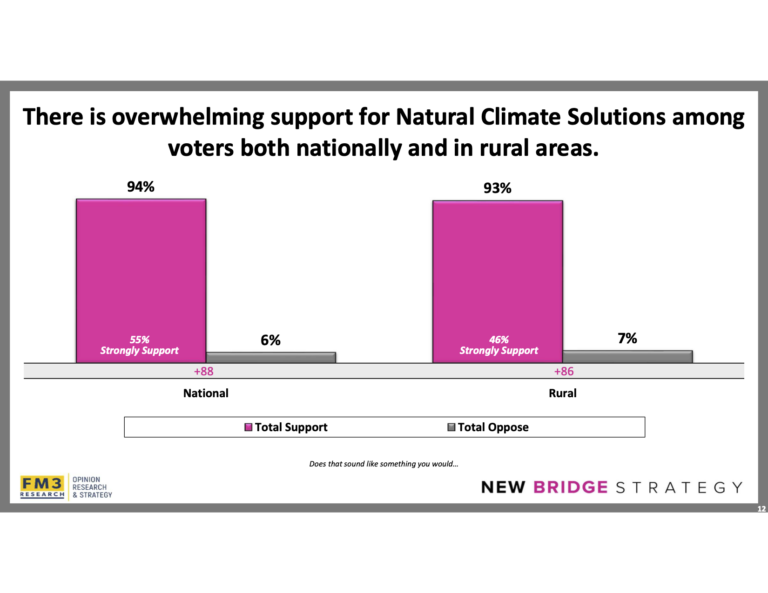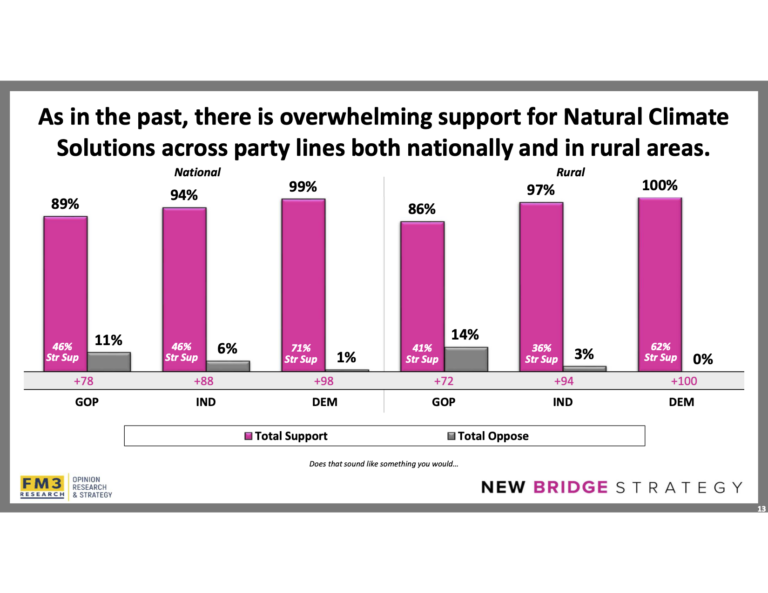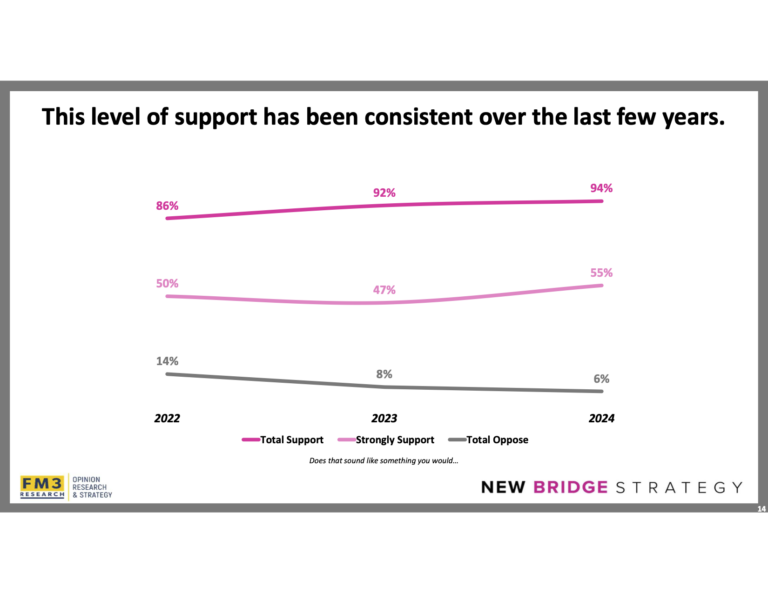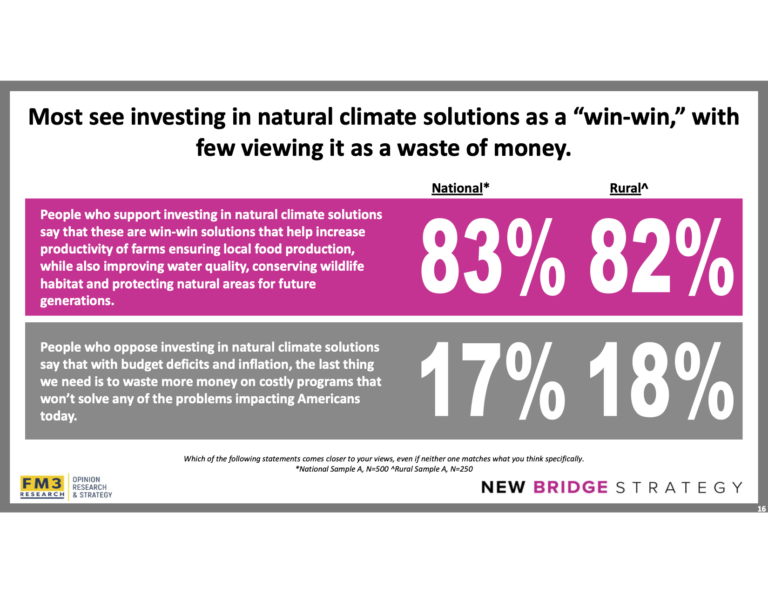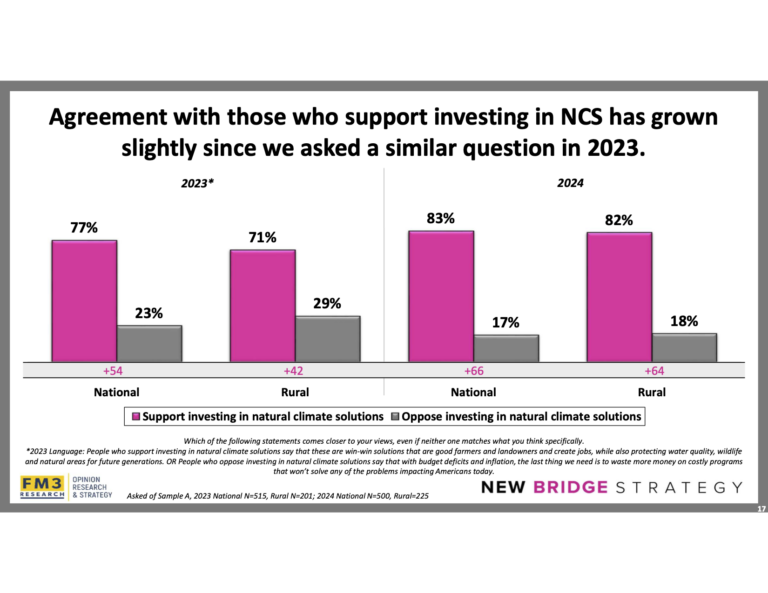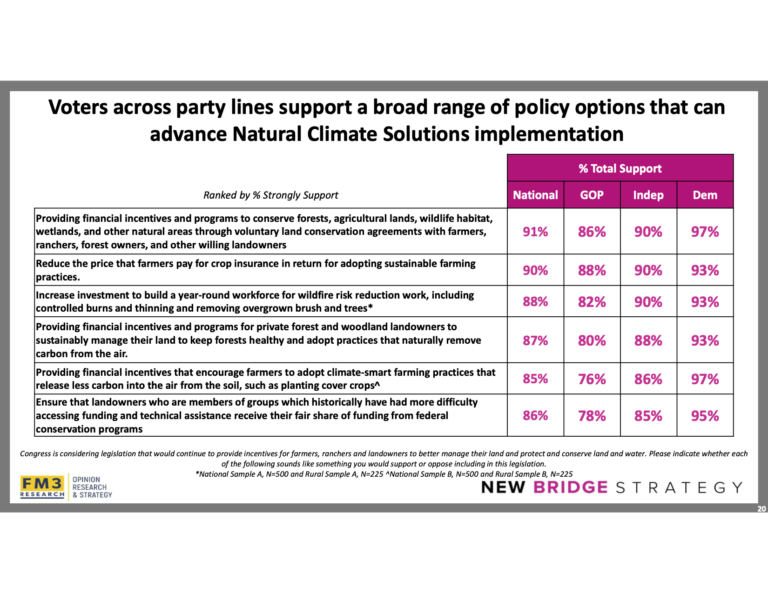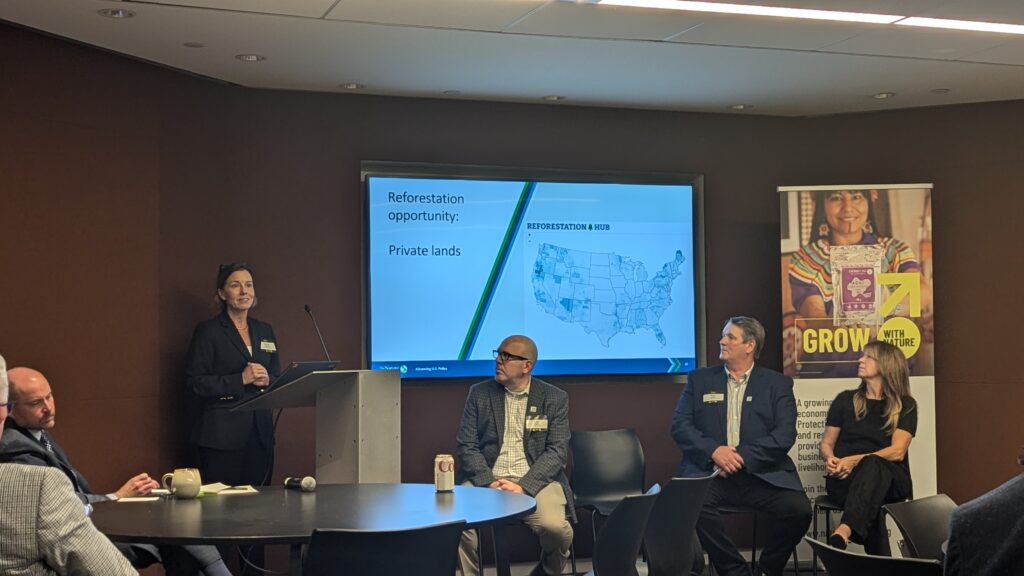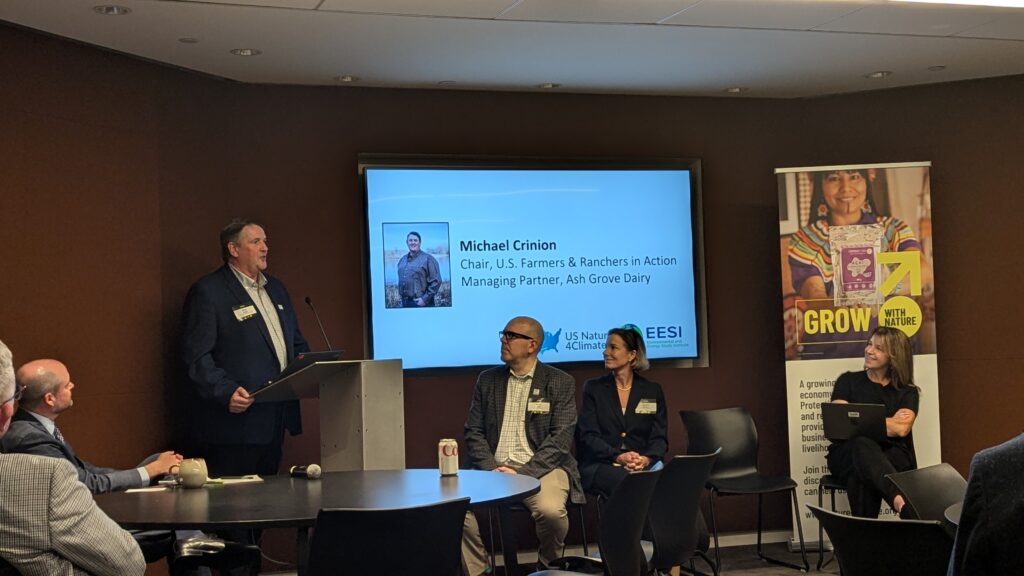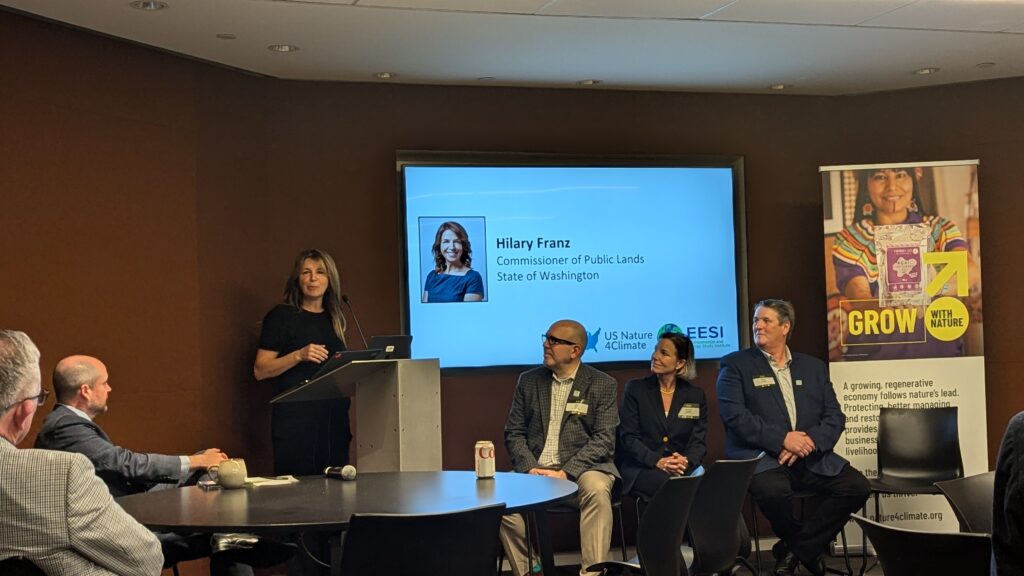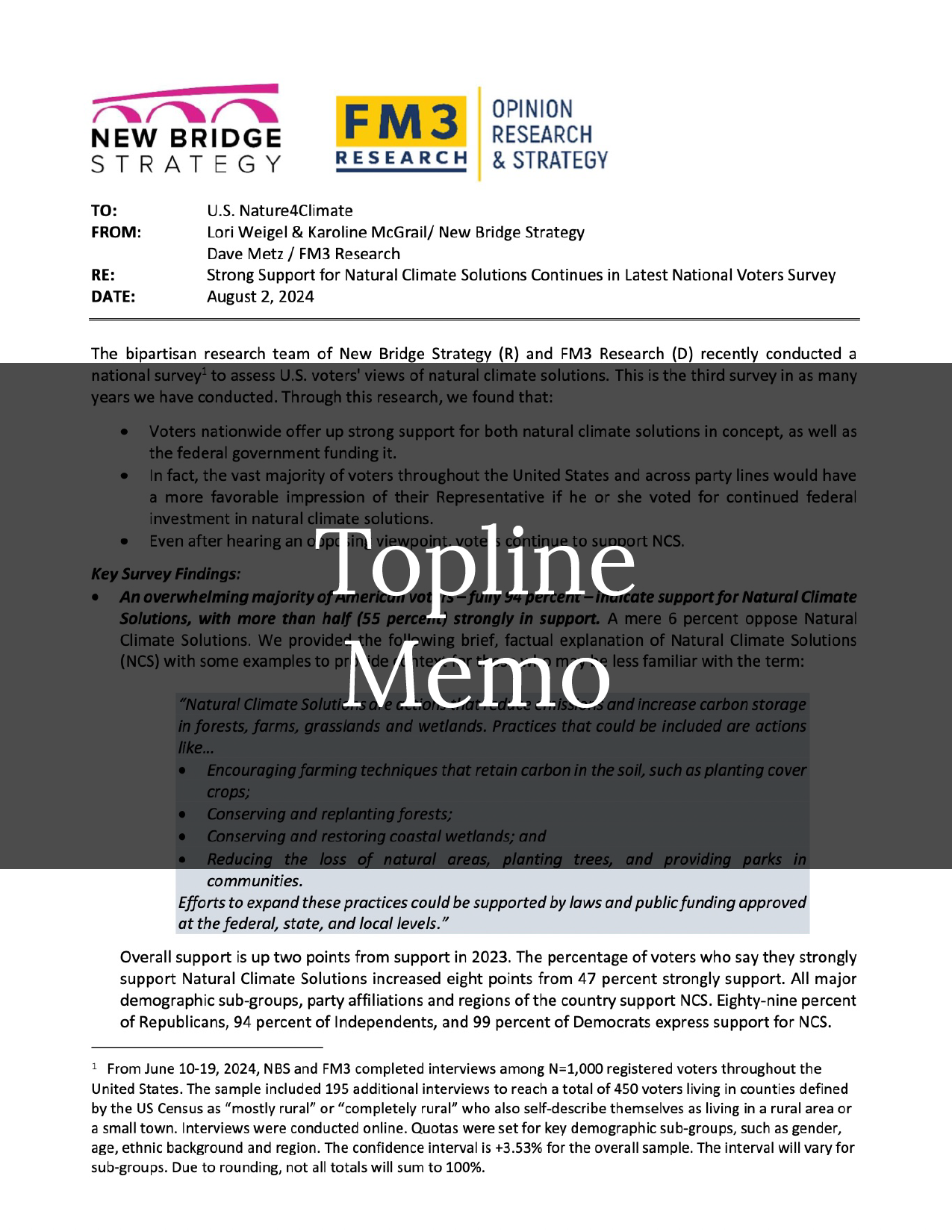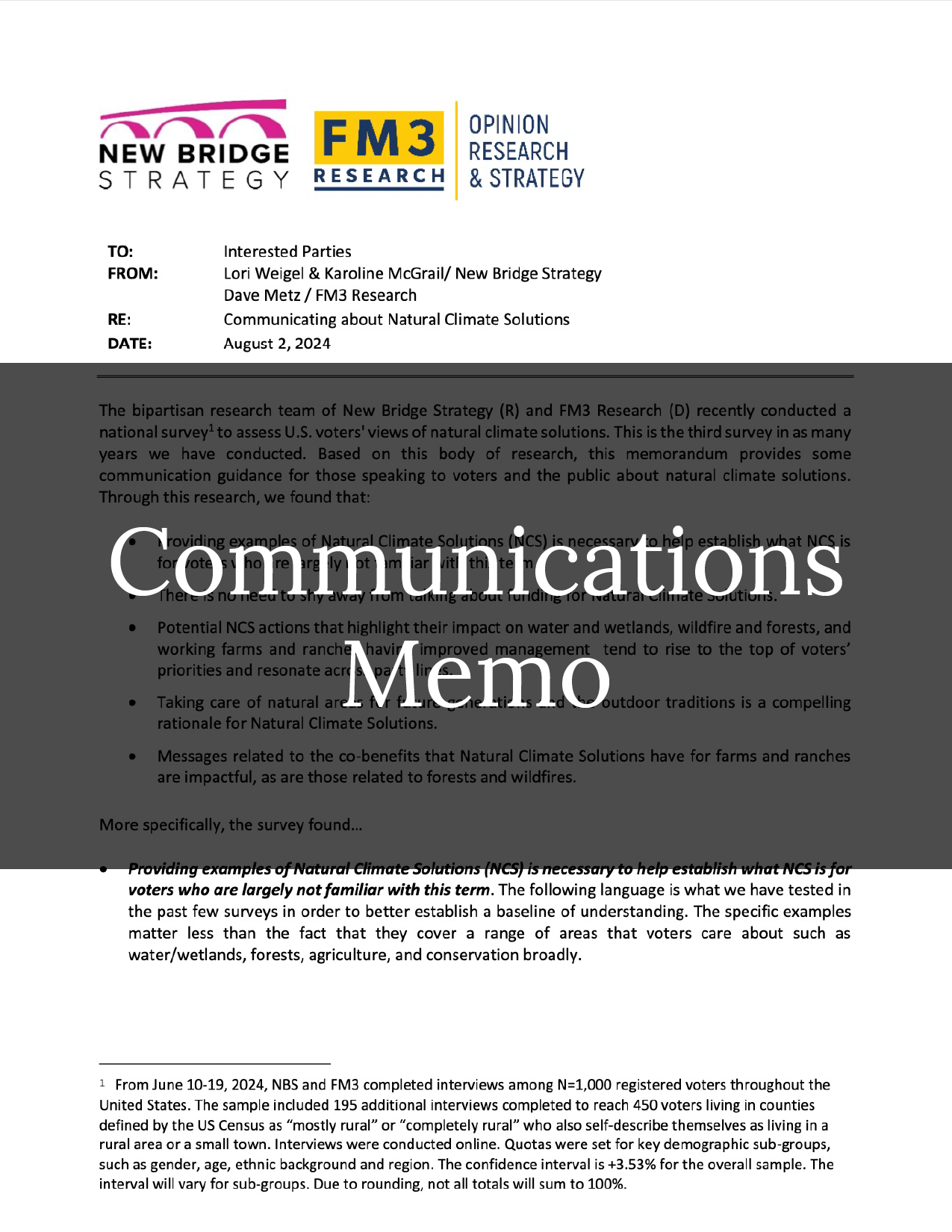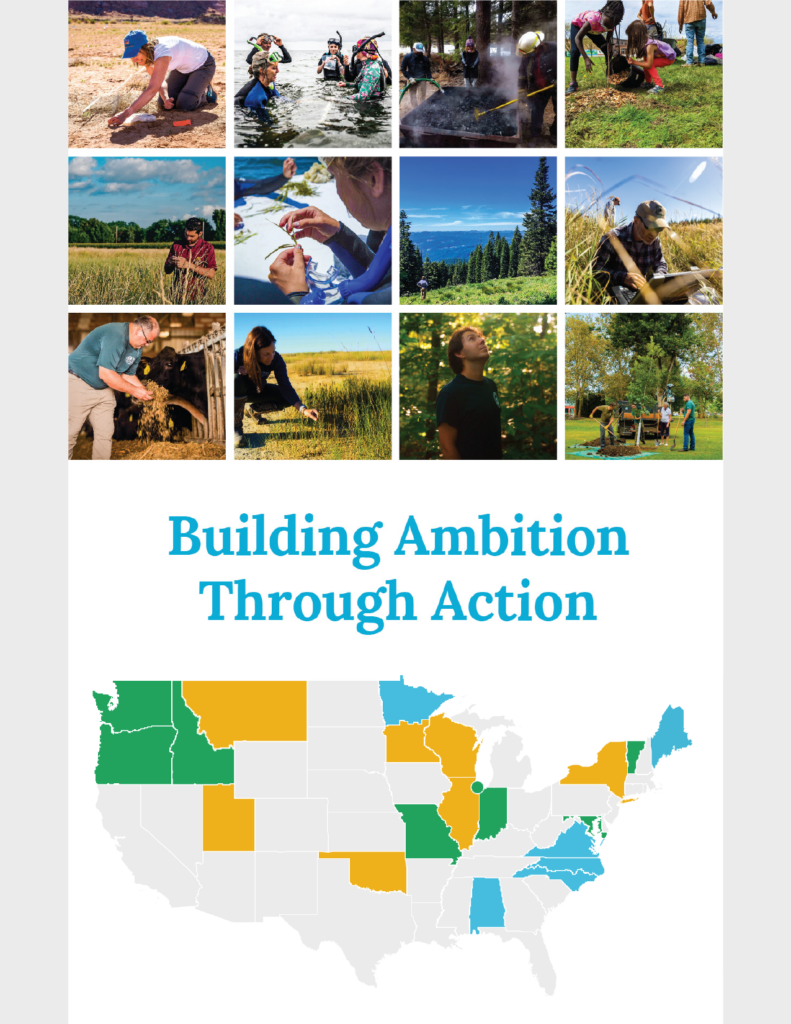At New York Climate Week, we had the opportunity to hear from Hilary Franz, Washington State’s Commissioner of Public Lands, as she outlined how Natural Climate Solutions (NCS) are bridging political divides and creating tangible, bipartisan economic and environmental benefits. One of our most important Natural Climate Solutions is protecting the forests, coastal wetlands, and grasslands we already have. In addition to storing carbon, these are the places that make America beautiful, and we owe it to future generations to protect them. They also provide habitat for wildlife and opportunities for hunting, fishing, hiking, and other recreation activities. Additionally, forests cover 800 million acres of land in the United States and can play a key role in addressing climate change. Planting more trees, protecting the trees we already have, and managing our forests to reduce the risk of catastrophic wildfire can help put our forests to work in our efforts to address climate change. With vast responsibilities managing millions of acres of public land, Franz has become a champion for stewarding our natural resources to address climate change while boosting local economies.
Managing Washington’s Natural Resources in the Face of Climate Change
As Commissioner of Public Lands, Franz oversees Washington’s Department of Natural Resources, which is responsible for managing and stewarding 6 million acres of aquatic, forest and agricultural land, restoring federal, state, and private forestland, providing critical funding for schools and communities, supporting recreational access, leading the state’s wildfire response, and overseeing the geological survey for the state. These lands encompass forest, agricultural, and aquatic areas that generate crucial revenue for the state and support jobs in rural communities. However, climate change has severely impacted her ability to manage these resources sustainably.
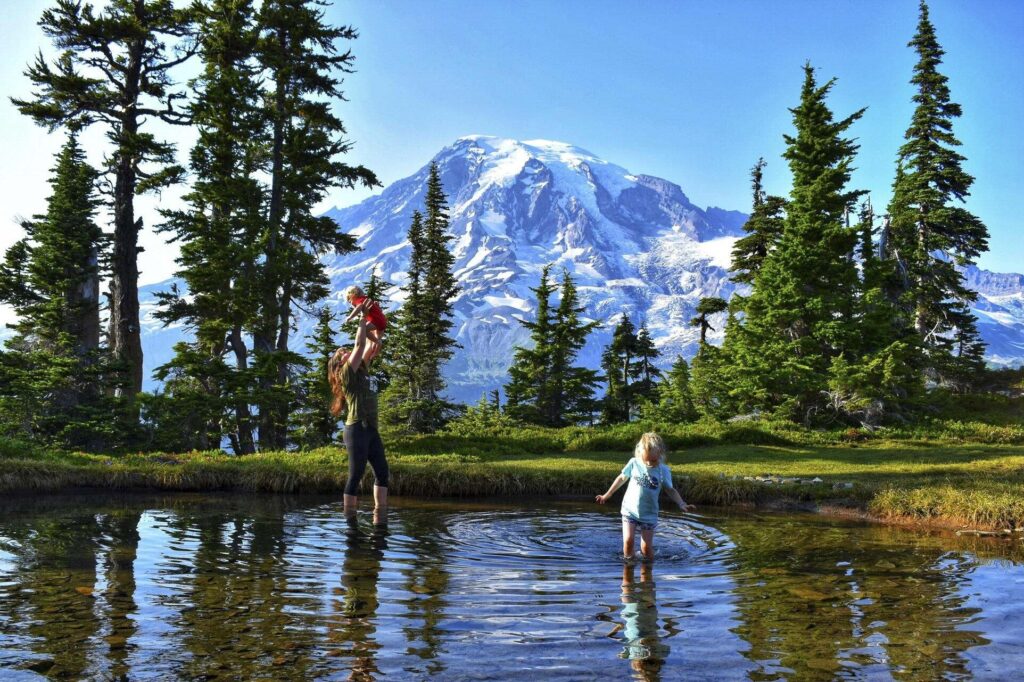
Protecting both lives and livelihoods must be the priority for climate action. Washington’s success has come from uniting stakeholders across political and ideological lines to focus on shared outcomes:
Hilary Franz, Commissioner of Public Lands for the State of Washington
Natural Climate Solutions.
“We’re seeing increasing sea-level rise, ocean acidification that’s decimating our kelp beds, droughts leading to dust storms, and forests under threat from wildfires and disease,” Franz told attendees. Wildfires, once an East-side problem, now plague the wetter, western side of the state. Communities dependent on these natural resources for their livelihoods are facing existential threats due to the compounding effects of climate change.
Franz stressed that protecting both lives and livelihoods must be the priority for climate action. The key to Washington’s success, she emphasized, has been uniting stakeholders across political and ideological lines to focus on shared outcomes—Natural Climate Solutions.
Natural Climate Solutions as an Economic Engine
In 2017, on the heels of catastrophic wildfires, Franz spearheaded Washington’s first Forest Health Plan to restore 1.25 million acres of forests. This plan was developed with broad stakeholder input, including environmental groups, timber industries, and rural communities, and signaled a shift in thinking: climate solutions can also be economic opportunities.
The forest health plan has already paid off. In response to the plan, two of the largest cross-laminated timber facilities in the U.S. opened in Washington. These facilities, which create sustainable wood products from small-diameter trees and waste material, were built within a year and a half of Franz’s announcement—demonstrating that bold commitments can quickly spur investment.
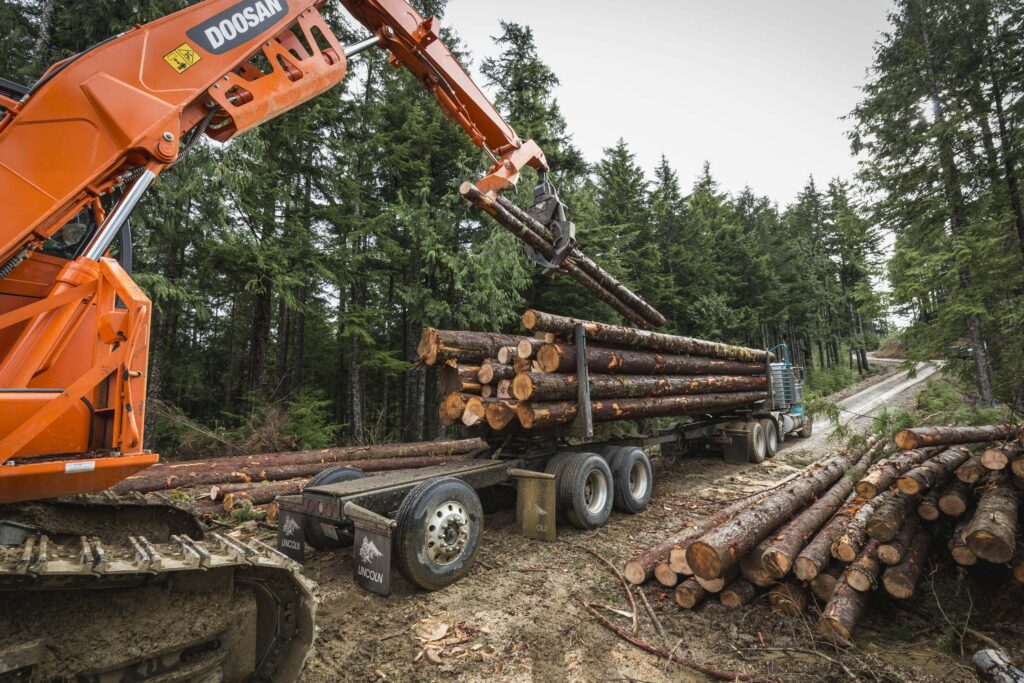
© Chris Crisman for TNC
Washington’s experience with Natural Climate Solutions, such as reforestation, sustainable agriculture, and biochar production, has led to job creation in areas hit hard by economic downturns. As Franz pointed out, these communities often feel the sting of environmental regulations, which historically limited their economic options. Now, through bipartisan collaboration and federal investments like those from the Inflation Reduction Act, new industries are breathing life into rural economies.
A new biochar facility—breaking ground with $40 million from the Inflation Reduction Act—is set to provide hundreds of jobs in one such community. Biochar production transforms wood waste into carbon-rich material that enhances soil health, offering a promising solution for both climate mitigation and job creation.
“We’re saving lives and livelihoods,” Franz remarked, adding that Washington’s successful efforts have united the state’s diverse communities across political lines, creating sustainable economic models that both urban and rural residents can support.
Healing Political Divides through Natural Climate Solutions
Washington State’s political landscape mirrors the deep divisions seen across the U.S., with urban and rural areas often holding conflicting views on environmental policies. Yet, Franz highlighted how Natural Climate Solutions can bridge these divides, emphasizing that they are key to achieving bipartisan climate action.
“We have to bring people together, rural and urban, conservative and liberal, if we’re going to make real progress,” Franz said. By emphasizing the economic benefits of Natural Climate Solutions—such as job creation, community stability, and resource management—Washington has been able to move forward despite political differences.

Franz noted that environmental policies historically hurt rural economies by prioritizing conservation over job creation. For example, the spotted owl controversy in the 1990s, which significantly limited timber harvesting, slashed the operating budgets of many Washington counties by more than half. The economic devastation bred resentment that still lingers today.
However, Franz and her team have shown that it doesn’t have to be a choice between jobs and the environment. Washington’s forest health plan demonstrates that restoring ecosystems can also generate revenue and support rural economies. “We’re proving that Climate Solutions—natural ones—can protect rural lives and livelihoods,” she emphasized.
A National Blueprint for Bipartisan Climate Action
Franz’s success in Washington offers valuable lessons for federal policymakers. First, Natural Climate Solutions, when implemented strategically, can address environmental challenges while spurring economic growth in struggling rural areas. These solutions also provide a way to unite communities and bridge political divides—something essential in today’s polarized political climate.
Franz’s message to policymakers was clear: Natural Climate Solutions are a critical tool for addressing both the climate crisis and economic instability. With appropriate support, these solutions can be scaled up nationwide to create resilient communities, restore natural landscapes, and stimulate job growth across rural America.
As U.S. policymakers look to replicate successful climate strategies at the federal level, Washington’s approach to Natural Climate Solutions offers a compelling model—one that delivers measurable benefits for both the economy and the environment, all while bringing together stakeholders from across the political spectrum.
Conclusion
Hilary Franz’s leadership in Washington shows how Natural Climate Solutions can turn environmental challenges into economic opportunities while fostering unity in divided communities. For U.S. policymakers, her message serves as a reminder that solutions to climate change are within reach—and that they can be pursued in ways that benefit both people and the planet.
Key Takeaways for U.S. Policymakers:
- Natural Climate Solutions, like reforestation and sustainable agriculture, offer significant job creation and economic benefits in rural areas.
- Broad stakeholder collaboration—across political, ideological, and economic divides—ensures success.
- Federal policies, including the Inflation Reduction Act, play a vital role in supporting these solutions and scaling them up nationally.
By continuing to champion Natural Climate Solutions, U.S. policymakers can help address the urgent challenges of climate change while supporting economic recovery and fostering bipartisan cooperation.
Related Reading
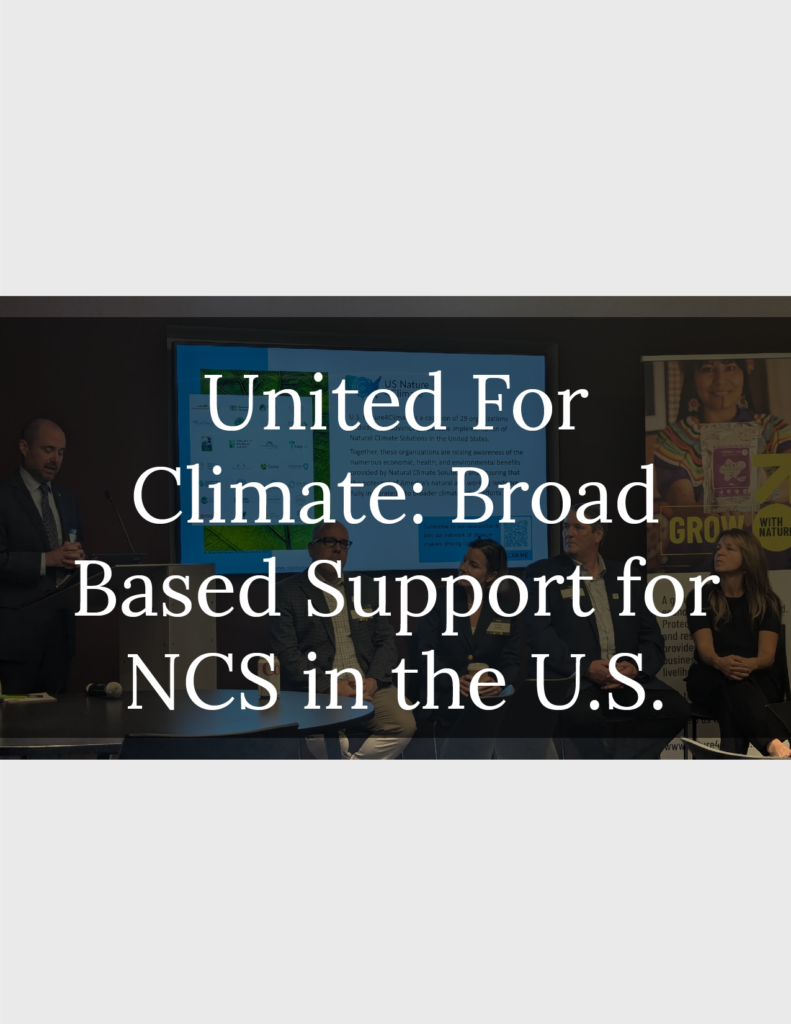
As the 2024 election draws near, bipartisan support for Natural Climate Solutions (NCS) is rising, offering a powerful path forward in the fight against climate change. Recent polling reveals that voters across party lines back efforts to protect forests, farmlands, and wetlands, signaling a unique opportunity for policymakers to drive impactful, cost-effective solutions. Discover how NCS is uniting diverse sectors—from agriculture to forestry—and bridging political divides to create a sustainable future.
Read more.
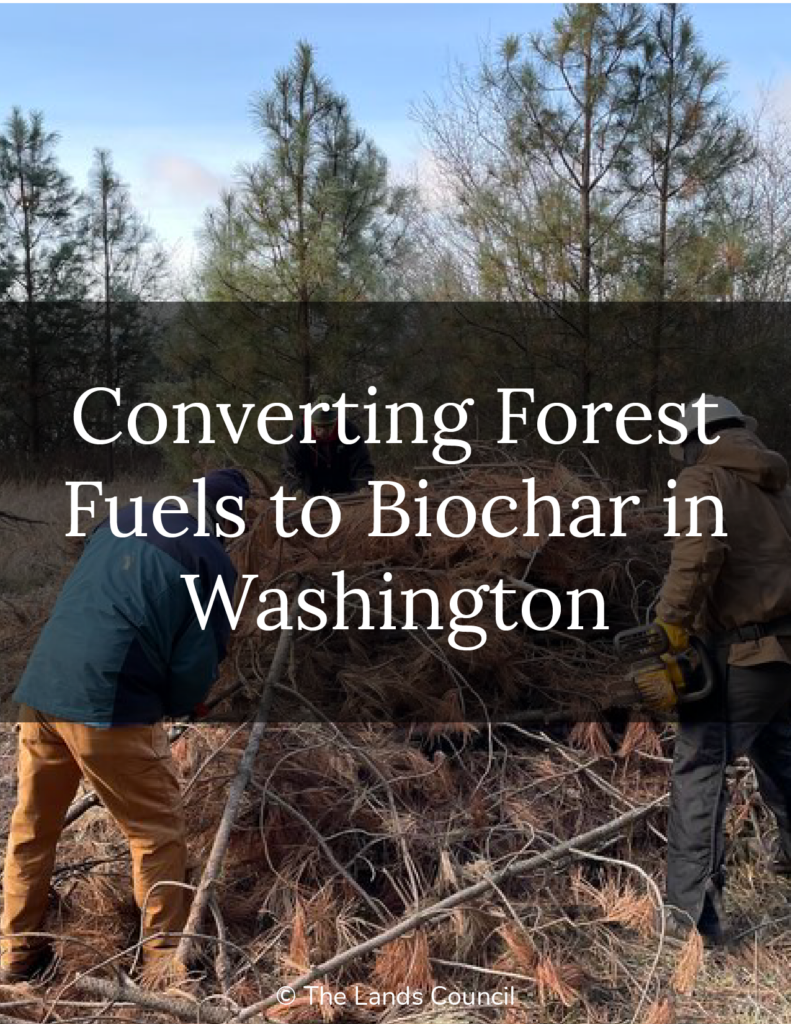
What is biochar and how can it be a tool to improve timber practices and reduce carbon emissions? The Lands Council partnered with the Kalispel Tribe of Indians and others on a pilot project to reduce forest fuels and transform them to beneficial biochar. Learn more.

A USN4C-commissioned June 2024 poll of 1,000 registered voters in the U.S. revealed that 94% support funding and laws to expand implementation of NCS. Explore a short 2-pager that walks through some of the most attention-grabbing numbers from the poll.

